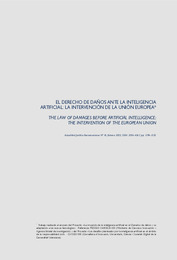Resumen :
El avance de las tecnologías y, en su seno, la inteligencia artificial presenta retos en todos los
sectores. En el ámbito jurídico, el encaje de los sistemas inteligentes no se presenta como una tarea sencilla. En
este sentido, las notas presentes en los mismos (racionalidad, autonomía, incertidumbre, complejidad, etc.) no
pueden predicarse de los productos que, hasta el momento, se utilizaban por los particulares. Todo ello, tiene
incidencia directa en el Derecho de daños y afecta a muchos de sus elementos. El propio criterio de imputación,
la determinación del nexo causal y la participación de una multiplicidad de sujetos, entre otras cuestiones,
precisan de una solución adecuada. Precisamente por este motivo, las instituciones de la Unión Europea han
ido emitiendo diferentes documentos en los que se reflexiona sobre todas estas disquisiciones. En el presente
estudio, abordaremos el análisis del tratamiento ofrecido por dichas instituciones al tema de la responsabilidad civil y, en última instancia, las tendencias que, parece, se adoptarán finalmente
The advancement of technologies and, within them, artificial intelligence presents challenges in all sectors.
In the legal field, the fit of intelligent systems is not presented as a simple task. In this sense, the notes present in them
(rationality, autonomy, uncertainty, complexity, etc.) cannot be predicated on the products that, until now, were used
by individuals. All this directly impacts the law of damages and affects many of its elements. The imputation criterion
itself, the determination of the causal link and the participation of a diversity of subjects, among other issues, require an
adequate solution. Precisely for this reason, the institutions of the European Union have been issuing different documents
reflecting on all these disquisitions. In this study, we will address the analysis of the treatment offered by these institutions to the issue of civil liability and, ultimately, the trends that, it seems, will finally be adopted.
|
 La licencia se describe como: Atribución-NonComercial-NoDerivada 4.0 Internacional.
La licencia se describe como: Atribución-NonComercial-NoDerivada 4.0 Internacional.
.png)
